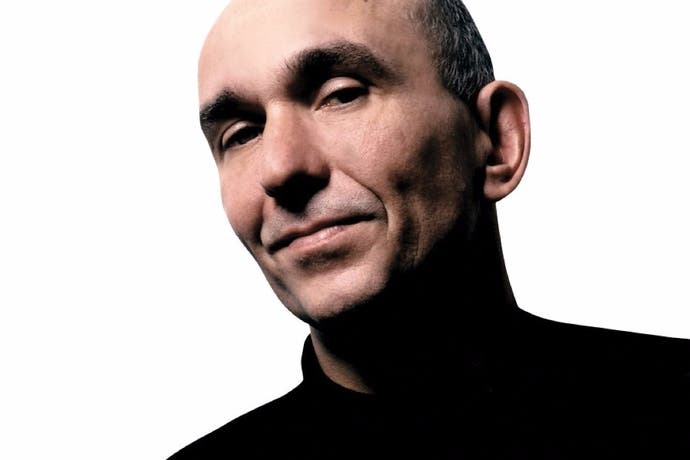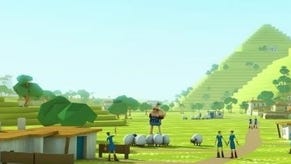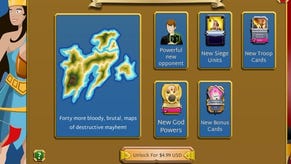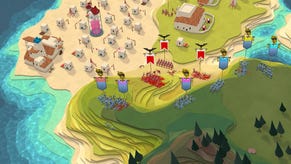"It was tempting to retire…"
After his self-imposed press exile, Peter Molyneux returns in an exclusive Eurogamer interview.
Peter Molyneux has changed. He's a new man with a new plan, after what he tells me was the most difficult year of his career.
Almost one year ago, things changed forever for Peter Molyneux, his studio 22cans and his controversial game Godus. In a week he'll never forget, Eurogamer revealed the plight of Bryan Henderson, the Scot who won mobile game Curiosity: What's Inside the Cube? but never received his prize. Then, a couple of days later, PC game website Rock, Paper Shotgun published an interview with Molyneux that sent shockwaves throughout the industry. It began with a question: "Do you think that you're a pathological liar?"
Molyneux had, for years really, come under fire for overpromising and under delivering, but Godus was the straw that broke the camel's back. Godus, a crowdfunded game billed as Populous for the next generation, had in many players' eyes turned out to be the opposite. At best it was a mildly interesting god game that involved way too much clicking. At worst it was a cynical cash grab designed first for the free-to-play, microtransaction fuelled mobile market, with PC consigned to an afterthought.
Then radio silence - and no updates for months on end. 22cans' communication failures, amid growing resentment over Godus and Peter's broken promises, came to a head that week. No longer protected by an army of public relations people from previous employer Microsoft, Molyneux was exposed, and he was beaten to a pulp.
"It was one of the most bruising moments of my life," Molyneux tells me. "My world changed after that interview."

We're sat inside a meeting room in 22cans' Guildford office. Through the window I see a sign for Lionhead, the Microsoft-owned creator of Fable. One of its buildings is, literally, a stone's throw away.
"That was the point where I said, this is just not going to work. To be called a pathological liar, which he said at the start... it's just not going to work, because how do you ever gain people's trust and belief after a journalist says that?"
(For his part, RPS journalist John Walker points out that he didn't call Molyneux a liar, but asked him if he thought he might be one.)
On Friday, 13th February 2015, Molyneux told The Guardian he would not speak to the press again. I remember reading that piece thinking, yeah, right. If I know anything about Peter Molyneux, it's that he loves talking about what he's working on. You see a glint in his eye as he does it. Molyneux's excitement at the potential of his own ideas often over-spills into the dictaphones of gleeful journalists - to the dismay of the developers who work under the legendary British designer. He has a childlike urge to say things he probably shouldn't, promise features that are, at the time, little more than ideas in his head. He can't help himself.
Well, much to my surprise, Molyneux remained true to his word. He has not gone on the record with any press in almost a year since the RPS interview was published.
"That interview started just like any other interview," Molyneux recalls. "You know, we'd like a word with you about Godus. So the whole of the interview was just a shock. And then afterwards, it was a really tough couple of days."
(John Walker maintains it was clear to Molyneux ahead of the interview that it would be about the controversy taking place that week.)
"You can't afford the luxury of just going in the corner and sobbing a bit because you've got an entire team of people who are just looking at you and saying, right, what does this mean? Does this mean the end of the company? Does it mean the end of you? What does it mean?"
It was indeed the end for some 22cans staff, I understand. Last year the studio endured an exile of sorts as staff grew bored of working on Godus, a game everyone, it seemed, hated. Development felt like a thankless task. People were, understandably, worried about their CVs, about potentially tarnished careers, and left the troubled Molyneux behind. For a studio of fewer than 30 people, it was an uncertain time.
After the RPS interview went live, Molyneux reacted emotionally.
"It was tempting to retire," he reveals. "Many of my counterparts from the late eighties have sat back and retired and left. I had always said this is my life and my passion, other than my family. That was a knife-edge decision."
But Molyneux didn't retire. Instead, he came up with a plan that involved ditching the press and getting back doing what he'd done during the Bullfrog days on games such as Populous and Dungeon Keeper.
"The moment that made the difference to me was when I said, what am I going to do with all this extra time? And how am I going to solve this problem, if I think of this as a problem rather than emotionally react to it, which is the tempting thing to do? The solution to the problem is to do a great game rather than talk about doing a great game. Let's put those two things together. That countered any childish feelings of saying, oh fuck it then I'm not going to do anything again.
"I recognise those in myself. I recognise when I put that phone down I felt like giving up. Whenever you have one of those big reactions to anything in life, it is always that child inside of you who comes up and says, well, fuck it then.
"I had the chance to stand back and I tried to get to the core of what that journalist was saying, which was, you're over promising and under delivering. What's the solution? Here, a year later, is the solution."
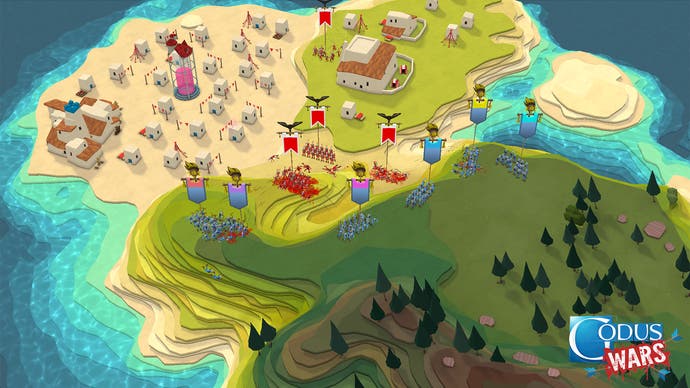
The solution is Godus Wars, a real-time strategy spin on the original Godus that's out now on Steam as an Early Access title. It's a free update for Godus owners, but you can buy it separately (for £10.99 you get Godus and Godus Wars). Right now, Godus Wars is a basic, player versus computer mode that charges you with conquering the world and battling rival gods for control over continents. Like so many games right now, a card system is included. Cards are used for God Powers, but you need to build up Belief as you're playing to use them.
The idea is Godus Wars paves the way for multiplayer, which will then lead to the God of Gods feature that, Molyneux promised, would feature Bryan Henderson. Henderson, by the way, is one of the deities in Godus Wars. You'll encounter him late game.
Molyneux worked as a coder and designer on Godus Wars, a shift in role enabled by last year's arrival of new CEO Simon Phillips. Phillips takes care of the business side of things, leaving Molyneux to get his hands dirty with programming.
All this, then, after the RPS interview.
"My strategy is this: you can't say anything to prove I'm not a liar," Molyneux says. "The only thing I can do is hunker down and strip myself back to what I really am, which is someone who just loves what he does with a passion that is often misinterpreted by people. And to stop being a spokesman, stop being a person journalists phone up when there's a new piece of hardware out, or when there's a new monetisation technique out, and just be a programmer and a designer. That happened within that 24 hour period after that interview.
"After a couple of days I came up with this simple strategy: I would just be a coder and a designer, and I would talk to the press perhaps about something I had done and had released, but not talk to the press about what I am doing, because that is clearly not working, and redefine my relationship with those people."
Molyneux's new approach was inspired by Bill Gates. Molyneux tells me of a meeting he attended, while working for Microsoft, in which Gates, frustrated at a lack of progress on a piece of software, declared he would go home and fix the problem himself that night.
"I use that all the time," Molyneux says with a smirk. During the development of Godus Wars Molyneux fixed the occasional bug, tweaked design and added his own personal touch to this and that. For example, spin the Godus Wars globe too fast and you'll hear your followers scream. That was Molyneux. Win a continent and your deity will shoot lasers out of its eyes, destroying the enemy god. That, too, was Molyneux.
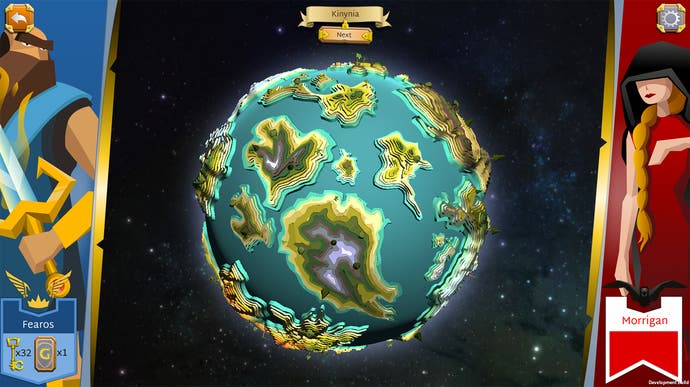
I've played Godus Wars for an hour or so. Early game, at least, it's an incredibly simple experience, with little depth to it. You begin by creating a base, building up Belief as your little people construct huts and, on higher ground, more elaborate buildings. You pump out archer units as you sculpt the land, dragging the mouse cursor to flatten or raise the landscape. All the while your computer-controlled opponent is doing the same thing. Eventually you create enough units to form an army, and attack.
This plays out amid the collection of cards. You gain a new card with each victory, building a deck of God Powers you can pick from before battles. I can see the potential, here, for a somewhat interesting layer of strategy: you're limited to taking four cards into battle, so at higher difficulty you'll need to pick your loadout carefully.
Then there's the tombola, which spins once the player and the computer have declared their hand before a match. The tombola adds a modifier. Examples I saw include cheaper God Powers, more expensive God Powers, and, most interesting of all, no sculpting.
Sculpting is key. Early game, I did little more than flatten land so my followers could create more buildings, thus generating more Belief. But higher ground gives armies an advantage over enemies positioned on lower ground, so late game you'll be creating hilltops on the fly in order to get an edge in combat, and messing with the land your enemy's troops march on.
Godus Wars is brutally simple, but it's a step in the right direction for a game most had suspected 22cans had abandoned. And, Molyneux insists, Godus Wars is PC first. There's no mobile version in active development, he says. Is it all too little, too late? Perhaps. But in a sign Molyneux might have learned his lesson, he's realistic when describing Godus Wars' ambition. More realistic than I've ever known him to be about anything he's ever worked on.
"Is it like a Call of Duty 3? No, it's not. It's a pure and simple game. For me, I find RTS' impenetrable at the moment. They're tweaked toward an audience which is hyper RTS. This is just pure and simple. You make a fucking big army and you go out and just fuck the other side. There's a pleasure and a delight in that and that is multiplied by the Powers.
"It's not designed or meant to be the next StarCraft 3. But it is something which is pure and simple, and I think in that simplicity and purity it is unique, especially when you have the sculpting. Later on in the game that becomes much more strategic and important when you can put units on top of hills and they defend those hills. It's charming and interesting.
"This is obviously something that's not a little patch. It's a game-changing update. I think it's addictive enough just to have that thought, I'll just do one more map, I'll just get one more card, I'll just beat this one continent.
"But I'm not portraying this as the greatest game of all time. It's charming. It's lovely. I loved playing it. I loved working on it. And that's what it is."
Peter, you've changed, I say.
"We haven't talked about The Trail yet!"
The new Molyneux will only talk to the press about something people can play there and then, he insists. Our interview takes place a week before 22cans releases Godus Wars. I'm playing it. It's out now. The new Molyneux is off to a good start.
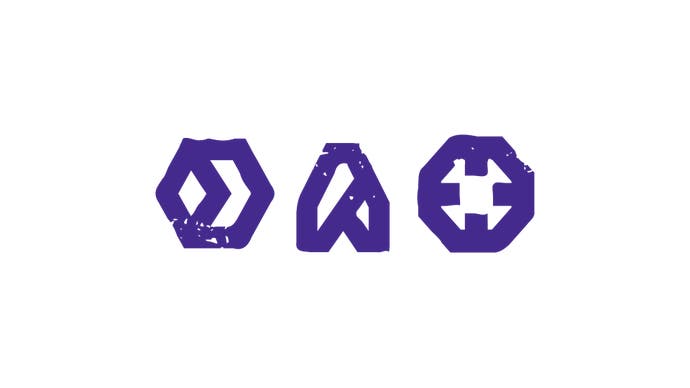
But what of Bryan Henderson, the god who Peter Molyneux forgot? Worryingly, he still has yet to receive any money from 22cans, which maintains the Scot's role as God of Gods will have to wait until the feature is released. But, Molyneux says, with the release of Godus Wars, there is now a clear path to multiplayer and Bryan's involvement in the game. There is no timeframe for all this happening, however. 22cans won't even commit to a 2016 launch when I press.
Henderson tells me that after Eurogamer's article was published last year, 22cans started emailing him with updates on Godus. They, perhaps, went a little bit overboard.
"It was every week," Bryan tells me over Skype. "And they were giving me so much information I didn't even need. It was like they were responding to how little they gave me before, and put it to the complete opposite extreme, and gave me all this information and updates every week. I said, just tell me what I need to know when you feel like you need to tell me."
During this time 22cans asked Bryan whether he'd be interested in making music for an upcoming documentary on the studio. He politely declined, citing mounting college work.
Then, four months of silence, until last month, when 22cans got in touch with Bryan again to reveal the upcoming launch of Godus Wars. He gave his blessing to appear in the game as a deity. The impression I get from Bryan, though, is one of indifference.
"I'm just going to be completely straight," he says. "To be perfectly honest, I'm almost past the point of caring about this whole thing, you know? It's just been a complete balls up, to be frank. I'm just going to ask them, how many of you are actually still passionate about this? I'd rather they did it with interest in it, or just didn't do it all all, you know? But we'll see when I talk to them."
So, how serious is 22cans about Godus now? 11 people have worked on Godus Wars, I'm told, which is a higher number than I expected. Molyneux, having familiarised himself with the game engine Unity, got stuck in alongside testers and designers and all the rest. Molyneux sounds committed to the game. There is a plan: Godus Wars first, then multiplayer, then God of Gods. The whole thing will need to make a certain amount of money for 22cans to continue development, as you'd expect, but, apparently, this "threshold" is low enough as to be realistic. We're talking tens of thousands of sales, here, not hundreds of thousands.
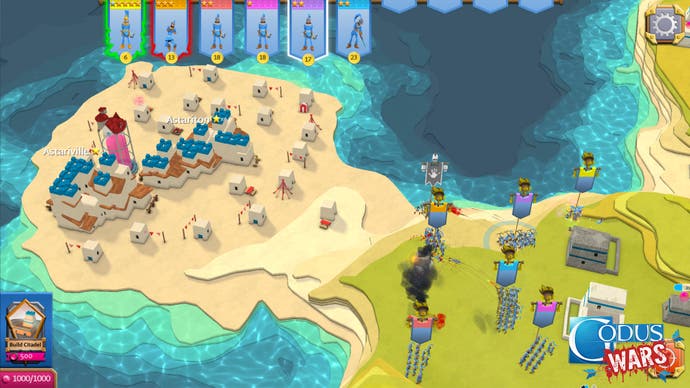
And then there's The Trail, 22cans' next game, which Molyneux won't talk about until he can show it.
"If they offer me a role in this game, I'm just going be like, no, come on," Bryan says with a laugh.
But, if 22cans offers Bryan a lump sum and calls Godus quits, he'd take it - despite losing out on being the God of Gods.
"I'm not crazy in love with the game anyway," he says. "And I don't think a lot of people are. If they wanted to do it that way, I wouldn't mind. Why not?"
Molyneux and 22cans is well aware of the negativity surrounding Godus. It knows it faces an uphill battle to regain customers' trust after the events of last year. The brutal truth is that Molyneux's reputation may never fully recover from the beating it suffered last year.
But now, Molyneux looks and sounds in a much better place now than he was a year ago.
"In one sense that event happening has made me a far happier person really, because not being exposed to the public, getting all that time back and just realising I didn't have to say, okay, the coding part of my life is over now, it's done, has been incredibly liberating," he says.
"I can now do the most ridiculous things. It's almost as if I feel like the time before was like painting a picture with one hand tied behind your back. You can paint the picture, but you often need both your hands to paint the picture. Now I feel the hand is untied."
Was that week in 2015, then, a good thing?
"I think it was a good thing, and I think it was destined to happen," Molyneux says.
"When you've got someone sticking his head up over the parapet, it's fine. But then you could see my relationship with the press just getting worse and worse and worse. You can talk all the press all you like, but talk about things you've done, not things you're going to do, because that doesn't work.
"Last year was a horrible year. Going through all that shit. If you want to look at the view from the top of the mountain you've got to climb it. The harder the climb, the better the view."
Some will baulk at all of this, of course, at the new Molyneux, at Godus Wars and 22cans and everything it stands for. And, I'm sure, some will call Molyneux a liar once again for breaking his promise not to talk with press ever again. I can see the comments now, and I put them to Molyneux.
"I've always talked to the press as a designer, and I think fundamentally that is a bit of a problem," he explains.
"A lot of the time the press are used to talking to people who really, carefully think through everything they say and probably have rehearsed it and gone through it with a fine-tooth comb to check for things. Whereas with me it just comes out. Sometimes it comes out with what I'm thinking at that particular moment. And sometimes it comes out about something I've been thinking about for a long time. That form of interview I really feel has had its day. It's certainly had its day for me. And so the idea of me hyping up a game, or talking about a game before it's available to the public, I just don't think it's going to work ever again.
"This interview does not mean me being back in the press," he counters. "I don't have time to be honest with you. I'd much rather keep hunkered down."
And yet, the old Molyneux, the one that got him into so much trouble in the first place, the one that talks about acorns and trees and dogs and connected worlds and what's inside the cube, is still there, bursting to get out, fighting against an almost uncontrollable urge to shout from the rooftops: I'm going to change the world with my video games!
"We're working on another project called The Trail," Molyneux says. "I'm not going to talk about that at all because this whole thing about me over-promising got so caustic that it actually worked as a negative. My shoulders are fairly broad and you can send me death threats or whatever you like. It's the team that hurt me more than anything else - the feelings people had here when they saw the press.
"We're not talking about The Trail at all. I'll only talk about it when it's released," he says.
You have announced it though, I counter.
"If I talked about it you would see exactly the person you recognised. I would be promising you, I would be shouting about it. When we launch it in whatever guise we launch it, I'll happily talk about it. It's almost an impossible urge for me... I did some coding on The Trail as well..."
